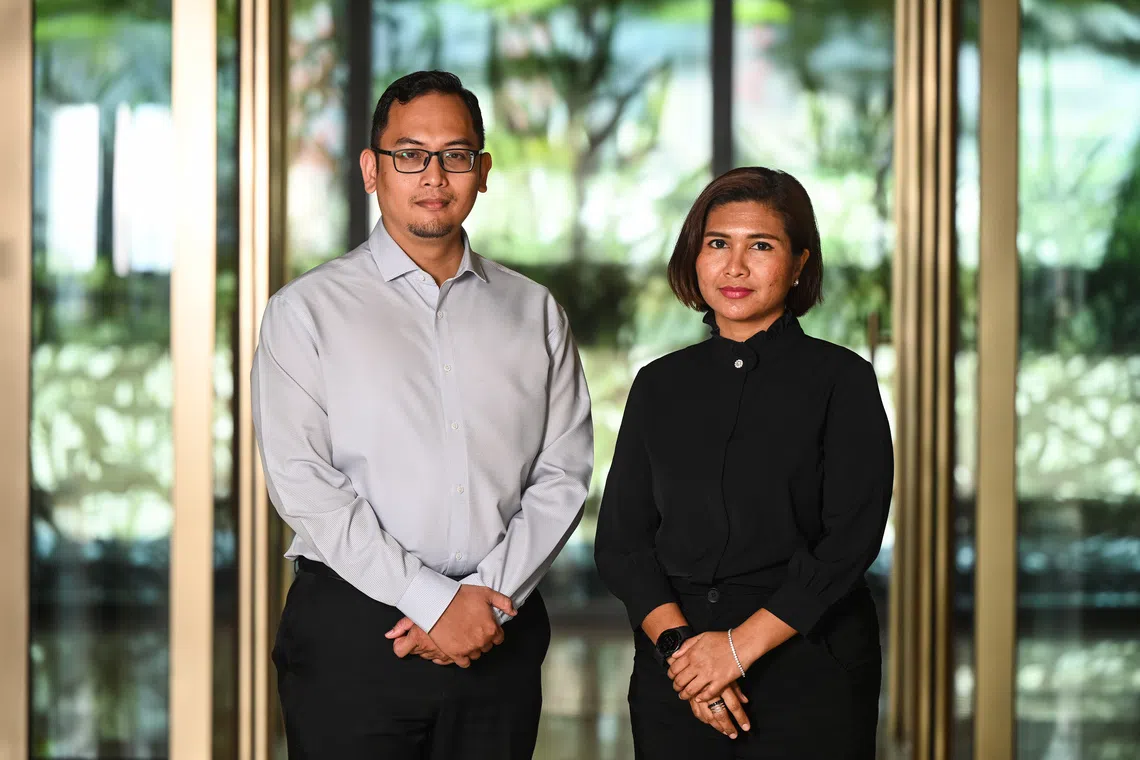Scholarships for three SUSS doctoral students researching Malay/Muslim community issues
Sign up now: Get ST's newsletters delivered to your inbox

Ms Nur Riduan (right) will research parenting practices and their impact on children’s reading skills, while Mr Muhammad Abu Sufian Hanafi is looking at understanding how culturally relevant counselling methods can strengthen Malay/Muslim families.
PHOTO: BERITA HARIAN
Irma Kamarudin
Follow topic:
SINGAPORE - Three doctoral candidates from the Singapore University of Social Sciences (SUSS) have become the inaugural recipients of three different scholarships, enabling them to conduct in-depth research on family, educational and social issues within the Malay/Muslim community.
Ms Nur Riduan, 38, received the Nurturing Future, Transforming Talent Scholarship, for her research on Malay/Muslim parenting methods and their impact on children’s reading skills in the context of early childhood education in Singapore.
Explaining her motivation to delve deeper into the research topic, Ms Nur said: “As a Malay/Muslim and a professional in this field, I felt it was important to explore this area more deeply, especially since there is limited research on Malay/Muslim parenting.
“I don’t suggest that all families should adopt the same parenting style, but I believe parents can benefit from greater research and education on ways to support their children’s literacy development.”
Meanwhile, Mr Muhammad Abu Sufian Hanafi, 41, was awarded the Liem Yok Bien Scholarship for his research on how culturally relevant counselling methods can strengthen Malay/Muslim families.
“I found that there was a research gap in the delivery of counselling within the Singapore Malay/Muslim community, even though it has been around since the 1950s,” said Mr Sufian.
“Many counselling methods are adapted from the West and integrated with local approaches. However, research materials are quite lacking in this aspect of integration,” he added.
The last recipient, Mr Muhd Jamaldin, 48, was awarded the Tekad Maju (Determination to Progress) Scholarship for his research into assessing socio-economic factors, learning environments, and government interventions in academic performance of Malay students from low-income families.
All three recipients will base their research on findings from a 2018 SUSS study, conducted in collaboration with Yayasan Mendaki and led by Associate Professor Sylvia Chong. That study examined educational and socio-economic issues among families in the bottom 10 per cent income bracket.
In a response to Berita Harian, Prof Chong said her previous study found that factors such as socio-economic status, as well as a strong foundation and skills gained during early childhood development, play a crucial role in a student’s academic achievement.
Therefore, she said, deeper research into these issues is vital as it allows for a better understanding of the intertwined family, educational, and social contexts that shape outcomes for the Malay/Muslim community, going beyond “surface-level statistics”.
“This knowledge empowers policymakers, educators and community leaders to design interventions that are not only equitable but also culturally grounded and sustainable,” she said.
SUSS chancellor Halimah Yacob said the scholarships are important because they allow for the generation of knowledge specific to the Malay/Muslim community and their lived realities.
“They ensure that our understanding of family, education and social issues is not abstract, but grounded in evidence and shaped by the voices of the community itself.
“This is important because it helps address inequality, informs better policies, and nurtures a pipeline of intellectual leaders who will guide the community’s development in the long run,” said Madam Halimah.
The three scholarships were made possible by contributions from several individuals who share a belief in the power of education to improve lives and strengthen communities.
Madam Halimah noted that the research would provide government agencies and self-help groups with the evidence needed to design and evaluate programmes more effectively. It will also highlight the specific nuances and challenges faced by the Malay/Muslim community, leading to more responsive and impactful interventions.
“My hope is that the scholars’ research will go beyond academic achievement to serve society in meaningful ways, such as by deepening the understanding of the challenges families face and providing evidence that informs sound policies and interventions.
“Most of all, I hope this work contributes to breaking the cycles of disadvantage – so that every child, regardless of background, can aspire, achieve and thrive, academically, socially and emotionally. This is how we build a more caring and inclusive Singapore,” she said.

